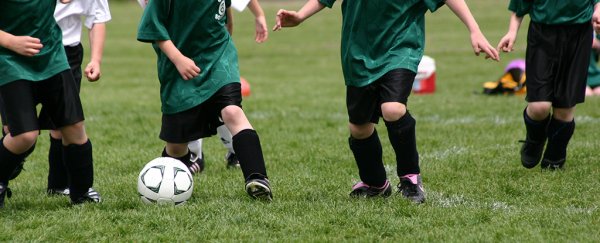Whether your experiences on the sports field are memories you cherish or things you'd rather forget, the findings of a new study could help explain a few things about your personal glory (or shame).
According to research looking at the relationship between practice and athletic achievement, it turns out that the number of hours put into training isn't very closely linked to performance.
The study collates data from 33 separate studies, and found that just 18 percent of the variance in performance was down to how much practice people were putting in. And among "elite-level performers", it was only 1 percent, which might explain why some of the best athletes only have to turn up to perform.
The findings don't mean practice won't improve your game, but they do suggest that other factors are more important when it comes to the range of abilities that we see out on the pitch, court, and field.
The study, which has been published in Perspectives on Psychological Science, also showed that there was no real link between the ages that people started playing sports and how good they ended up being at them.
Lead researcher, psychologist Brooke Macnamara of Case Western Reserve University, says we shouldn't overlook the importance of that 18 percent link between practice and performance. But at the same time, she questions the idea that anyone can become accomplished at anything, as long as they're prepared to put in the hours.
"If a person practises, they will get better," Macnamara told Brian Resnick at Vox. "Almost across the board, practice should improve one's performance."
"Essentially, learning rates vary," she added. "Some people improve very quickly with less practice, while others require much more practice."
That leaves the question of what's making up the other 82 percent of factors that influence athletic performance.
Macnamara suggests a combination of personality, perseverance, injury record, coordination, height, and other biological characteristics – like our maximum oxygen uptake, and how we acquire muscle mass – all play a role. How much someone enjoys the competition is also likely to be important too.
Back in 2014, Macnamara and her colleagues looked at the influence of practice on a much wider range of skills, from music to education, and came up with similar findings – variance levels were between 26 percent and 1 percent.
"There is no doubt that deliberate practice is important, from both a statistical and a theoretical perspective," said Macnamara at the time. "It is just less important than has been argued. For scientists, the important question now is, what else matters?"
The findings follow other studies that have come to similar conclusions about practice not necessarily making perfect. From playing the piano to playing chess, it now seems clear that there's a whole lot more going on besides how much time you put in to master your chosen sport or craft.
So if you're the weak link in your local team's line-up, it seems you won't necessarily be able to bridge the gap by putting in extra hours on the training field… although it should still make some difference, and you'll never know if you don't try, right?
Never say die, folks!
